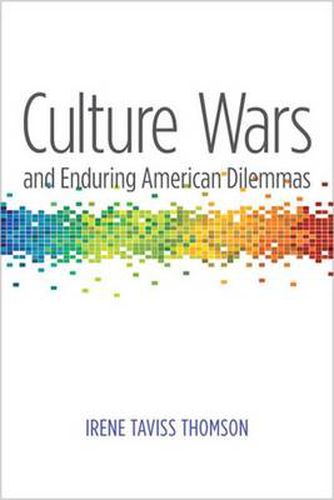Readings Newsletter
Become a Readings Member to make your shopping experience even easier.
Sign in or sign up for free!
You’re not far away from qualifying for FREE standard shipping within Australia
You’ve qualified for FREE standard shipping within Australia
The cart is loading…






Research showing America’s politics may be more based on personal choice than party or cultural divisions. The idea of a culture war, or wars, has been around in America since the 1960s: at its heart, the theory says that an underlying ideological schism in our country is what’s responsible for the polarizing debates on everything from the separation of church and state, to abortion, to gay marriage, to affirmative action. Irene Taviss Thomson, in
Culture Wars and Enduring American Dilemmas , addresses at an unprecedented level of detail the question of whether political and public intellectuals on both sides of political debates actually turn out to be pretty much the same when it comes to their attitudes on cultural questions. She also takes on the discussion of how culture actually operates as a factor in real-world activities and attitudes. To accomplish the task, Thomson analyzed hundreds of articles addressing hot-button issues over two decades in four magazines:
National Review ,
Time ,
The New Republic , and
The Nation . She also examined a wide array of other writings and statements from a substantial number of public intellectuals from all camps. What she found might surprise you: based on her research, there is no single cultural divide or cultural source that can account for the positions that have been adopted. The differences between people who are hypothetically on the same side of the ‘culture wars’ are in fact at least as great as the differences they have with the people who ‘oppose’ them. And while issues such as religion, homosexuality, sexual conduct, and abortion have figured prominently in public discussion, in fact there is no single thread that unifies responses to each of these cultural dilemmas for any of the writers. Americans have been debating public morality as long as there has been an America. Thomson contends that those discussions don’t take place within a single set of values; instead, the country wrestles with a series of dilemmas, each revisited as new issues or situations evoke it.
$9.00 standard shipping within Australia
FREE standard shipping within Australia for orders over $100.00
Express & International shipping calculated at checkout
Research showing America’s politics may be more based on personal choice than party or cultural divisions. The idea of a culture war, or wars, has been around in America since the 1960s: at its heart, the theory says that an underlying ideological schism in our country is what’s responsible for the polarizing debates on everything from the separation of church and state, to abortion, to gay marriage, to affirmative action. Irene Taviss Thomson, in
Culture Wars and Enduring American Dilemmas , addresses at an unprecedented level of detail the question of whether political and public intellectuals on both sides of political debates actually turn out to be pretty much the same when it comes to their attitudes on cultural questions. She also takes on the discussion of how culture actually operates as a factor in real-world activities and attitudes. To accomplish the task, Thomson analyzed hundreds of articles addressing hot-button issues over two decades in four magazines:
National Review ,
Time ,
The New Republic , and
The Nation . She also examined a wide array of other writings and statements from a substantial number of public intellectuals from all camps. What she found might surprise you: based on her research, there is no single cultural divide or cultural source that can account for the positions that have been adopted. The differences between people who are hypothetically on the same side of the ‘culture wars’ are in fact at least as great as the differences they have with the people who ‘oppose’ them. And while issues such as religion, homosexuality, sexual conduct, and abortion have figured prominently in public discussion, in fact there is no single thread that unifies responses to each of these cultural dilemmas for any of the writers. Americans have been debating public morality as long as there has been an America. Thomson contends that those discussions don’t take place within a single set of values; instead, the country wrestles with a series of dilemmas, each revisited as new issues or situations evoke it.